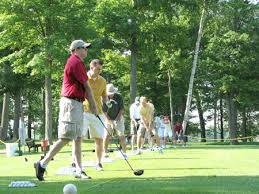Golf Psychology Resources
Would you like to improve your mental game on the golf course?
How much of golf is mental?
This is a question for a debate, some golfers would argue 10%, some 50%, some 99%. I’d say in the region of 70%. Why? Because everything starts with your thought processes and decisions that you make. Below are some examples:
- The option of practicing; how much time you allocate to different parts of your game and how you go about practicing. Whether you decide to aim for the “perfect” technique in a practice session or set it up so you can allow yourself to be more adaptable on the golf course.
- Whether you decide to give yourself the best chance of swinging how your coach wants you to by deciding to improve your flexibility or range of movement.
- Choosing to take some nutritious food with you in your golf bag to improve your concentration, likely saving you at least a shot a round.
- The choices you make about whether to spend money on equipment as a quick fix or to seek some assistance for your mental game.
- Before a round or tournament, managing your anxiety levels the night before or hours prior to competing.
- On the course or in practise – your awareness of pre shot routine and post shot routines.
- Also on the course or in practise, managing your expectation levels.
- Managing your emotions so that you play freely no matter what is thrown at you.
- Staying in the present moment, not dwelling on mistakes that you have made or getting ahead of yourself thinking about the holes ahead of you.
- Curing the yips or involuntary movements in your putting stroke, chipping, pitching or full swing.
I’m an amateur golfer and I’m curious how a Sports Psychologist can help me improve my golf?
Everyone who was played golf knows that the mental and emotional aspects of the game have a huge influence on your scores. In golf, during a 4 or 5 hour round, you can experience such a range of emotions from excitement to disappointment, from laughter to sadness, calmness to anger. Playing golf can be like life, over a shorter period of time and without real consequences. How you manage your emotions can arguably save you or cost you 10 shots +. How we, as Sports Psychologists, help golfers is to arm you with tools to keep your mind quiet and that’s not all!
We also help you in the following ways:
- Focus on the right things, the things that you do at your best so that you attend to helpful performance cues not task irrelevant cues.
- Improve your motivation and commitment levels, to the shot itself and to practice by working in collaboration with you so that you practice in the most effective way possible.
- When you face setbacks and obstacles, as we all do in life and sport, supporting you to overcome them and think rationally so that they don’t impact too heavily on your performances or mental health. Examples would include, if you experience a serious injury, relationship breakdowns, bereavements or if you have choked and thrown a great opportunity to win away or are fighting to save your career.
- Some people naturally focus on the negatives, our job is to build you up so that you act, think and behave on the course or the range more positively with an aura of confidence. Away from golf we also work with you to boost how you feel about yourself.
- Lifestyle factors such as travelling or transitions such as moving home, raising a young family or considerations around retirement can be an challenge for some. Our personality can dictate whether we are organised or not – some people really benefit from assistance in this area.
Demystifying Mental Toughness Podcast

Demystifying Mental Toughness is a podcast for people who want to reach their goals faster and are curious what high performing athletes and professionals do to fulfil their potential. If you’re a motivated athlete, coach, sport psychologist, mental game coach or executive listen in for proven and practical advice in this podcast.
How should I mentally prepare for a golf tournament or round of golf?
This is a really interesting question – which many people get wrong. Ultimately to perform at your best it’s important to approach your round of golf or tournament with a sense of trust and freedom. When people talk about “The Zone” they often say they are free from thoughts, yet people compound that by reactively practicing or overdoing their preparation – thinking about golf too much in the days or hours leading up to a tournament or competition.
Our support is there to help you find ways to best switch off and relax in the build up to a round or tournament so that you can perform at your optimal level and are not standing on the first tee, mentally fatigued and +2 before you hit a shot.
How can I get better at golf without changing my swing or equipment?
So as a Sports Psychologist, sadly, we are usually the last port of call – we are the people golfers seek out when they’ve spent a fortune on equipment and have tried different grips, stances and moves in their swing, but have failed to get any better or have gotten a lot worse.
We help golfers improve by having an awareness of what they do over shots and putts when they’re at their best. What they focus and attend to – at their best. How they spend the time between shots whilst waiting for their playing partners.
Other things we may look at is their effectiveness in transferring practice to competitive situations. I wonder…Do you practice simply beating balls? Do you practice when you’re tired in an evening? Do you practice only working on technique not factoring in creative practice, process practice, pressure practice or on course practice?
We help you see why you do some of the things you do and why some of your habits hold you back and prevent you from playing your best golf under pressure. We then, importantly, help you to put new plans in place and take ACTION.
I'm beginning to hate playing golf. Can Sports Psychology support help me start enjoying my golf again?
This is really common, especially when golfers focus too much on technique trying to make the perfect swing or stroke when they practise and compete. Why? Because the perfect swing or stroke doesn’t exist. When was the last time you played 2 rounds exactly the same? When was the last time you hit 2 shots exactly the same on the golf course?
Another thing which also causes a big problem for golfers is when they focus too heavily on the score or their handicap. Their head begins to drop and before they know it, they are physically present on the golf course but their mind is elsewhere and they fail to enjoy the game.
We help people understand why they play golf and appreciate what they get out of the game. We then help them change their focus so that they can begin playing with a smile on their face again. Often that then means they perform better, perform more freely and shoot better scores.


